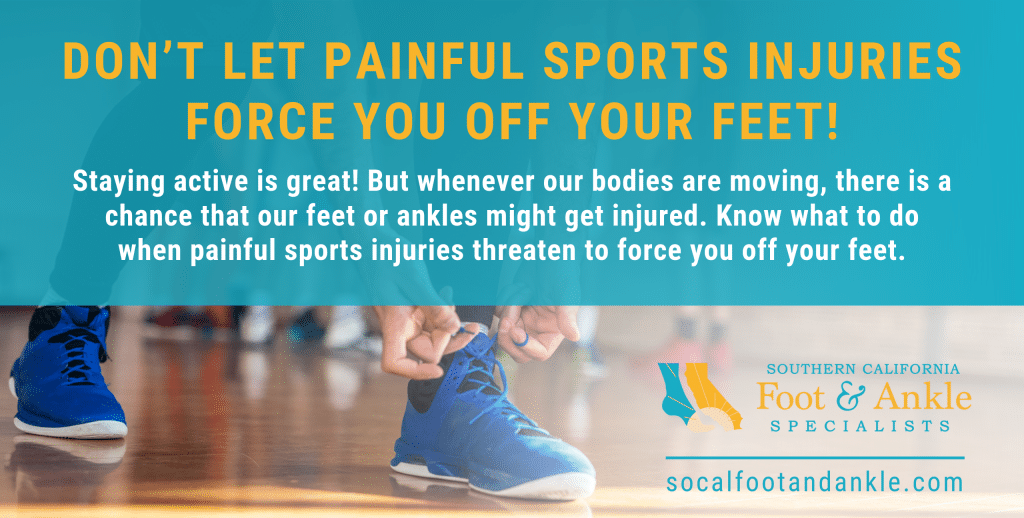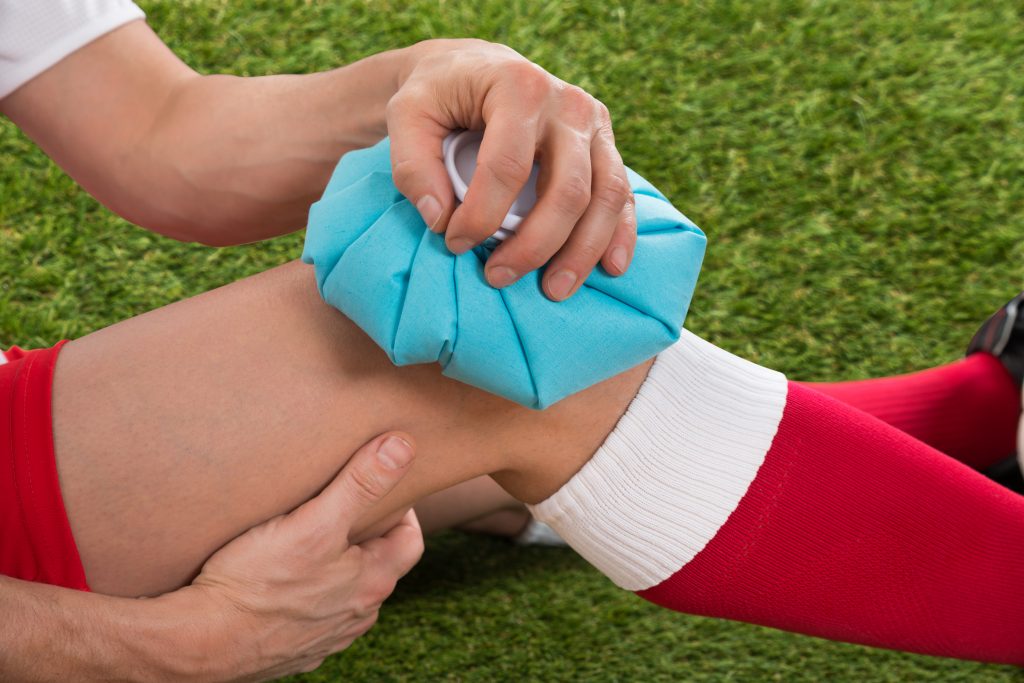Don’t Let Painful Sports Injuries Force You Off Your Feet!
There are many reasons to exercise on a regular basis. Doing so not only improves your resting heartrate, but also helps you manage your weight, relieve stress, and sleep better at night. Research shows that leading an active lifestyle can even sharpen the mind!
What you probably don’t know is that regular exercise is also important for the health of your feet. And since we rely on our feet every day for mobility and independence, shouldn’t we take better care of them? Our team at Southern California Foot & Ankle Specialists say: Absolutely!
In fact, a proper exercise routine can improve blood flow, as well as strengthen muscles and keep tendons and ligaments limber. All are essential for keeping your feet safe and lowering your risk of experiencing painful lower limb problems.
Now, while we love to hear about patients who stay physically active, you should keep in mind there is always a certain degree of injury risk any time your body is moving. From less serious conditions like ingrown toenails, to more severe ones like ankle sprains and fractures, there are many things that can go wrong as you charge through the soccer field or sprint toward the finish line.
No need to worry though! You can count on us to get you back on your feet whenever painful sports injuries come about. But first, what are some of the most common foot and ankle sports injuries you can experience?
Common Foot and Ankle Sports Injuries
After a friendly game of football or a successful run in the local 5K, you can expect to feel some aches and pains – this is not unusual. But sometimes discomfort can become more than just a temporary inconvenience – this, on the other hand, is not normal and ignoring the problem will likely make it worse.
Some of the most common sports injuries we treat at our office include:
- Sprains and strains. These usually occur when a muscle becomes overused or overstretched. Strains happen when the tendons or muscle fibers are injured, while sprains occur because the ligaments are stretched or torn.
- Toenail injuries. These types of injuries can occur if your shoes are too tight. Sometimes simply wearing shoes while exercising may cause problems like ingrown toenails – especially if you play a sport that involves a lot of quick movements that push your toes against the ends or tops of your shoes.
- Tendon injuries. Tendon injuries, like Achilles tendinitis, occur as a result of intense exercise, sprains, trauma and muscle imbalances. They may affect your arch, heel, Achilles tendon, and other parts of your feet and ankles.
- Stress fractures. Stress fractures are usually caused by overuse. After repetitive jumping and running motions, tiny cracks in the bone may begin to develop and grow over time when left untreated.
If you ever suspect you have suffered a sports injury (or any other type of foot or ankle injury, for that matter), stop what you’re doing and contact our office as soon as possible. We can properly evaluate your condition, determine an accurate diagnosis, and provide the most beneficial treatment for your specific situation.
Early treatment is essential for optimal healing. So is taking time away from high-impact activities until the injury is completely healed. And though these conditions may be common, it’s important not to ignore them. When left untreated, your condition will worsen over time and may even become a chronic, long-term issue.
But there is good news:
Most sports injuries can often be treated effectively with conservative measures. So even if you’ve been putting off getting the help you need for fear that “going under the knife” may be your only option for recovery, you can find comfort knowing this is rarely ever the case.
Treating Sports Injuries
When it comes to nonsurgical care for sports injuries, the best starting point is immediate first-aid measures. For a quicker recovery, remove yourself from the physical activity (do not try to “play through the pain), then follow the RICE therapy steps:
- Rest. Your body has a remarkable ability to heal itself, but in order to do so, it needs time. This means you will have to put sports activities on hold until you fully recover from your injury.
- Ice. Apply ice to the injured area for 20 minutes at a time. Make sure you protect your skin by using a thin towel.
- Compression. Wrap the injured area snuggly – but without being too tight! – in a compression bandage to reduce any potential swelling or inflammation.
- Elevation. Maintain the injured foot elevated above heart level for as long as possible to keep the area from swelling.
Keep in mind that RICE therapy should not be used to replace appropriate medical treatment. Even if you think your feet are good to go after a day of rest, it’s best to have your condition evaluated at our office. We will be able to determine whether professional care is needed (and, if so, we can then create a treatment plan so you can get back to your favorite activities as safely and as quickly as possible).
Preventing Sports Injuries
Of course, even better than providing the best treatment options available to get you back on your feet is teaching you how to prevent painful sports injuries in the first place.
Here are some things to keep in mind:
- Wear the right shoes. Choose footwear that provides enough arch support and heel cushioning. Make sure there is plenty of room in the toe box to move your toes freely. And always consider the specific obstacles you may face within your sport of choice when buying shoes.
- Prepare your feet before exercising. Always warm up and stretch before beginning any physical activity.
- Pace yourself. Never begin intense exercise right away. Remember to pace yourself and work up to the desired intensity.
- Trim your toenails the right way. Make sure they are not too short nor too long, and never round out the corners.
And remember, if you have any questions, or need any type of foot or ankle care, give Southern California Foot & Ankle Specialists a call today. You can reach our Ladera Ranch office by dialing (949) 364-9255(WALK) or by filling out our online contact form.


